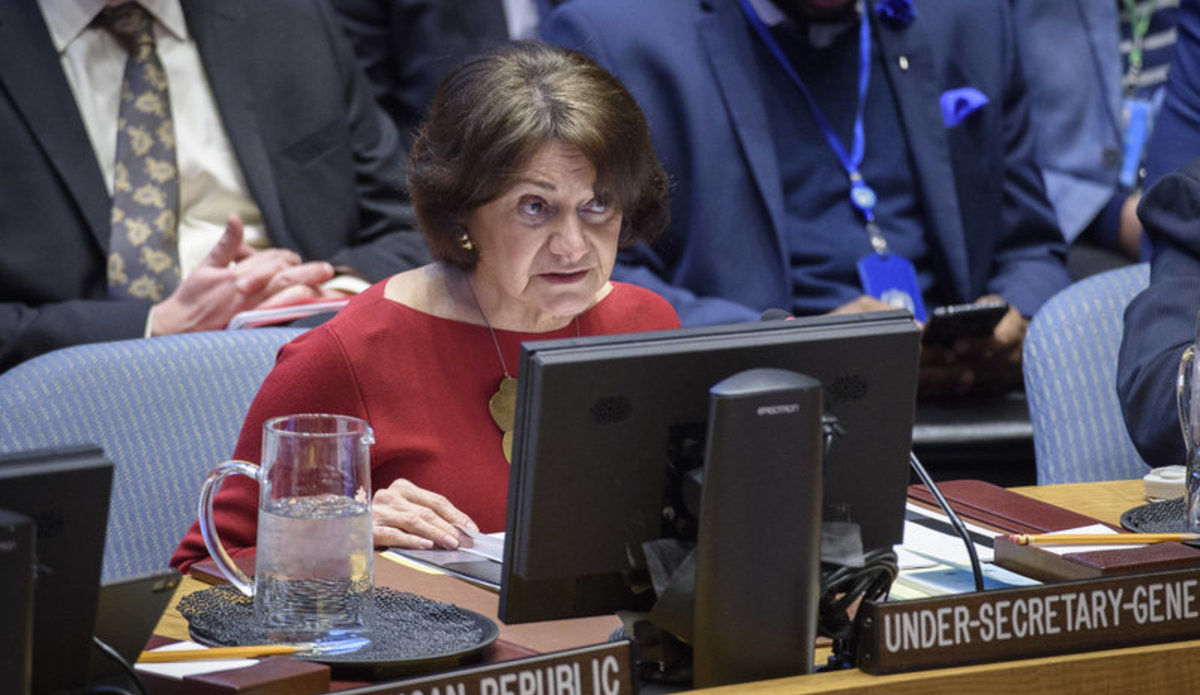Honorable Ministers,
Excellencies
The situation in Venezuela is cause for serious concern. The protracted crisis in the country has had a grave impact on the population, with high levels of political polarization, growing humanitarian needs and serious human rights concerns. And the economic situation in the country has become dire.
The situation has both an economic and political dimension. The population is affected in a systemic way, i.e., nearly all 30 million Venezuelans are affected by hyperinflation and a collapse of real salaries; shortages of food, medicine and basic supplies; deterioration of health and education services; deterioration of basic infrastructure such as water, electricity, transport and urban services. Drastic reduction in production capacities in the agricultural, pharmaceutical and other sectors have aggravated the supply situation.
The drop in oil production recorded in recent years continued in 2018, with a decrease of about half a million barrels per day from 2017, and a consequent fall in revenues. The International Monetary Fund reported that the inflation rate hit 1.37 million per cent last year and projected real GDP in 2019 of negative 18 per cent. According to the Food and Agriculture Organization, between 2015-2017, there were 3.7 million undernourished people in the country. Infant mortality rates doubled in recent years.
According to UN estimates, over 3 million Venezuelans are now living abroad, including some 2.3 million who have left the country since 2015, going mostly to other South American countries.
Mr. President,
In the parliamentary elections of December 2015, the opposition won a large majority of seats in the National Assembly. Subsequently, the Supreme Court ruled that the Assembly was “in contempt” and that all its actions were “null and void”. In 2017, a National Constituent Assembly was established through elections in which the opposition parties did not participate.
The National Constituent Assembly took over key functions of the legislative branch and undertook a process of constitutional reform that remains inconclusive and is not recognized by the opposition parties.
Attempts to bring about political dialogue started as early as May 2016, through an initiative facilitated by three former presidents from the Dominican Republic, Panama and Spain, under the auspices of the Union of South American Nations (UNASUR).
Despite some initial progress, no concrete agreements were reached through this initiative, which was suspended by the beginning of 2017.
By mid-2017 there were efforts to resume dialogue and formal talks began in September, hosted by the Dominican Republic and with international accompaniment. Talks ended without agreement on February 2018. One of the major areas of disagreement was the electoral calendar and guarantees to ensure free, transparent and credible elections.
Subsequently, the Government went ahead with presidential elections in May 2018. President Nicolás Maduro was declared the winner over two other candidates. Most of the opposition did not participate in the elections or recognize the results.
On 10 January, Nicolás Maduro was sworn in as President for a second six-year term.
On 23 January, large scale opposition protests culminated with Juan Guaidó, president of the opposition-led National Assembly, announcing that he did not recognize President Maduro or his Government. Mr. Guaidó proclaimed himself interim President, pledging to form a transitional government and call for elections.
While the protests were largely peaceful, there were incidents of violence. The Secretary-General has expressed strong concern over reports of casualties among demonstrators and has called for a transparent and independent investigation of these incidents.
According to the Office of the UN High Commissioner for Human Rights, credible local sources have reported that at least 20 people have died in the unrest. Many more have reportedly been injured and detained in violent incidents.
The High Commissioner stated yesterday “Any violent incident resulting in death or injury should be subject to an independent and impartial investigation to find out whether there was excessive use of force by the authorities, or if crimes have been committed by members of armed groups, pro-government or otherwise…I am extremely concerned that the situation in Venezuela may rapidly spiral out of control with catastrophic consequences.”
The High Commissioner also stressed that it is of utmost importance to uphold the right to peaceful assembly and refrain from excessive, disproportionate and indiscriminate use of force.
Mr President,
In a statement on 24 January, the Secretary-General emphasized the urgency for all relevant actors to commit to inclusive and credible political dialogue to address the protracted crisis in the country, with full respect for the rule of law and human rights.
He has offered his good offices to help resolve the crisis. The main concern is the wellbeing of the Venezuelan people and their ability to enjoy their full rights.
The UN has been providing assistance, particularly in the areas of health and nutrition. And the Secretary-General had asked the International Organization for Migration and the UN High Commissioner for Refugees to establish a mechanism to support Venezuelans leaving the country. IOM and UNHCR appointed Eduardo Stein, former Vice-President of Guatemala, as their Joint Representative to work with regional Governments to ensure that support is in place to these individuals.
Mr President,
As the Secretary-General has stated, in this crucial moment, it is important that all actors exercise maximum restraint to avoid an escalation of violence and confrontation.
There are divergent visions of what the future should hold for Venezuela.
But we must all be guided by the pursuit of the wellbeing of the Venezuelan people, and work together so that their needs are fully met.
We must do all we can to prevent a worsening of tensions.
We must try to help bring about a political solution that will allow the country’s citizens to enjoy peace, prosperity and all their human rights.
Thank you, Mr. President.

